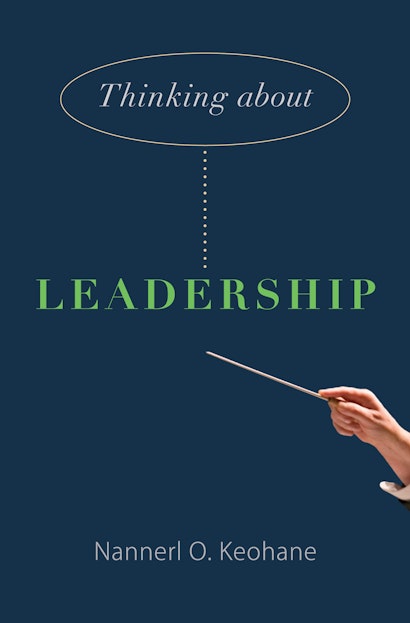Leadership is essential to collective human endeavor, from setting and accomplishing goals for a neighborhood block association, to running a Fortune 500 company, to mobilizing the energies of a nation. Political philosophers have focused largely on how to prevent leaders from abusing their power, yet little attention has been paid to what it actually feels like to hold power, how leaders go about their work, and how they relate to the people they lead. In Thinking about Leadership, Nannerl Keohane draws on her experience as the first woman president of Duke University and former president of Wellesley College, as well as her expertise as a leading political theorist, to deepen our understanding of what leaders do, how and why they do it, and the pitfalls and challenges they face.
Keohane engages readers in a series of questions that shed light on every facet of leadership. She considers the traits that make a good leader, including sound judgment, decisiveness, integrity, social skill, and intelligence; the role that gender plays in one’s ability to attain and wield power; ethics and morality; the complex relationship between leaders and their followers; and the unique challenges of democratic leadership. Rich with lessons and insights from leaders and political thinkers down through the ages, including Aristotle, Queen Elizabeth I, Franklin D. Roosevelt, and Nelson Mandela, Thinking about Leadership is a must-read for current and future leaders, and for anyone concerned about our prospects for good governance.
"Keohane understands as well that advice about the 'right balance between disparate qualities'—exhibiting warmth or distance; eliciting love or fear—isn't all that helpful because 'it does not come with instructions for knowing when to use one approach and when the other.' Leadership, Keohane reminds us, is as essential in a democracy as it is in a monarchy, oligarchy, or a dictatorship."—Glenn Altschuler, Huffington Post
"Keohane's book is to be recommended, particularly if you are an academic thinking about becoming a leader."—Amanda Goodall, Times Higher Education
"Political scientist, political theorist, and former president of Wellesley College and Duke University, the eminent scholar and leader Keohane has applied her considerable talents and experience to help readers better understand the complex world of leadership. . . . [Thinking about Leadership] is a very good introduction to many of the key aspects and controversies in leadership and is recommended for general audience interested in taking a first step into the field of leadership studies."—Choice
"[Thinking about Leadership] captures two aspects of leadership that seem pretty fundamental. The first is its definition of leadership. . . . The second is her emphasis on the importance of judgment."—Diane Coyle, Enlightened Economist
"[A] gentle, reflective book that examines the relevant literature, supports and refutes it with anecdotal evidence, and sifts everything through Keohane's own experiences as president of Wellesley College and Duke University. . . . She's not telling anyone how to be a leader; she's raising questions that ought to interest anyone interested in the role or the topic."—Sharon Shinn, BizEd Magazine
"Keohane's exploration of the unique demands placed on all leaders, both men and women, in democracies is especially interesting. . . . Keohane's rich personal experiences and her deep engagement with political theory (informed by literature and the arts) therefore provide important insights into leadership."—Haig Patapan, Australian Review of Public Affairs
"The manner in which dilemmas connected with the theory of leadership are presented is noteworthy and thus this book ought to be read by those interested in this issue."—Maciej Hardifiski, Political Studies Review
"Nan Keohane breaks down leadership to the fundamentals—a combination of innate ability and acquired skills that helps motivate others to work toward a common goal. This book is about inspired leadership—and inspiring 'followership'—and should be required reading from the classroom to the boardroom."—John Mack, chairman of the board, Morgan Stanley
"Nan Keohane's book is well-titled. Its focus is on thinking about leadership—exploring its many facets, complexities, and conundrums. It is not a 'how-to-do-it' book, but rather a sophisticated amalgam of the reflections of an author who is both a political philosopher and an experienced leader. Readers will enjoy—as well as learn from—the many references to the experiences of well-known leaders such as Mandela and Lincoln as well as to the voluminous literature on leadership."—William G. Bowen, president emeritus of Princeton University and the Andrew W. Mellon Foundation
"Drawing on her impressive skills as a leader and political theorist, Nan Keohane has made a major contribution to the study of leadership. This book is both thoughtful and wonderfully readable. The chapter on gender, alone, is worth the price of admission!"—Joseph S. Nye, Jr., Harvard University, author of The Powers to Lead
"A wonderfully thoughtful meditation on what it means to lead, and to follow, by a noted political philosopher who knows the boardroom as well as she knows the seminar room. This study of leadership stands out for its clarity, candor, depth, and humanity. A must-read for anyone—leader or follower—confronting the manifold opportunities and dilemmas of power."—Josiah Ober, Stanford University
"Nan Keohane is both an insightful political theorist and an experienced leader who is uniquely suited to thinking about leadership. This refreshing and richly textured discussion raises fundamental questions—why we need leaders, how leaders differ from followers, what is good leadership for democracies—and provides strikingly original observations in response."—Ruth Grant, Duke University
"Thinking about Leadership is replete with important, telling, and original insights and information. The book addresses key questions about leadership that, while not necessarily new, need to be posed, over and over again. Nannerl Keohane does not know how to write a bad sentence or make an uninteresting point."—Barbara Kellerman, author of Bad Leadership: What It Is, How It Happens, Why It Matters
"Thinking about Leadership is one of the best books on leadership I have ever read. If more people—especially leaders and would-be leaders—were to read it, it would broaden their assumptions about what they could and should do. Keohane draws upon impressive, high-level personal experience as a leader. Her reputation as a scholar is equally and deservedly superb."—Joanne Martin, Fred H. Merrill Professor, emerita, Stanford University


